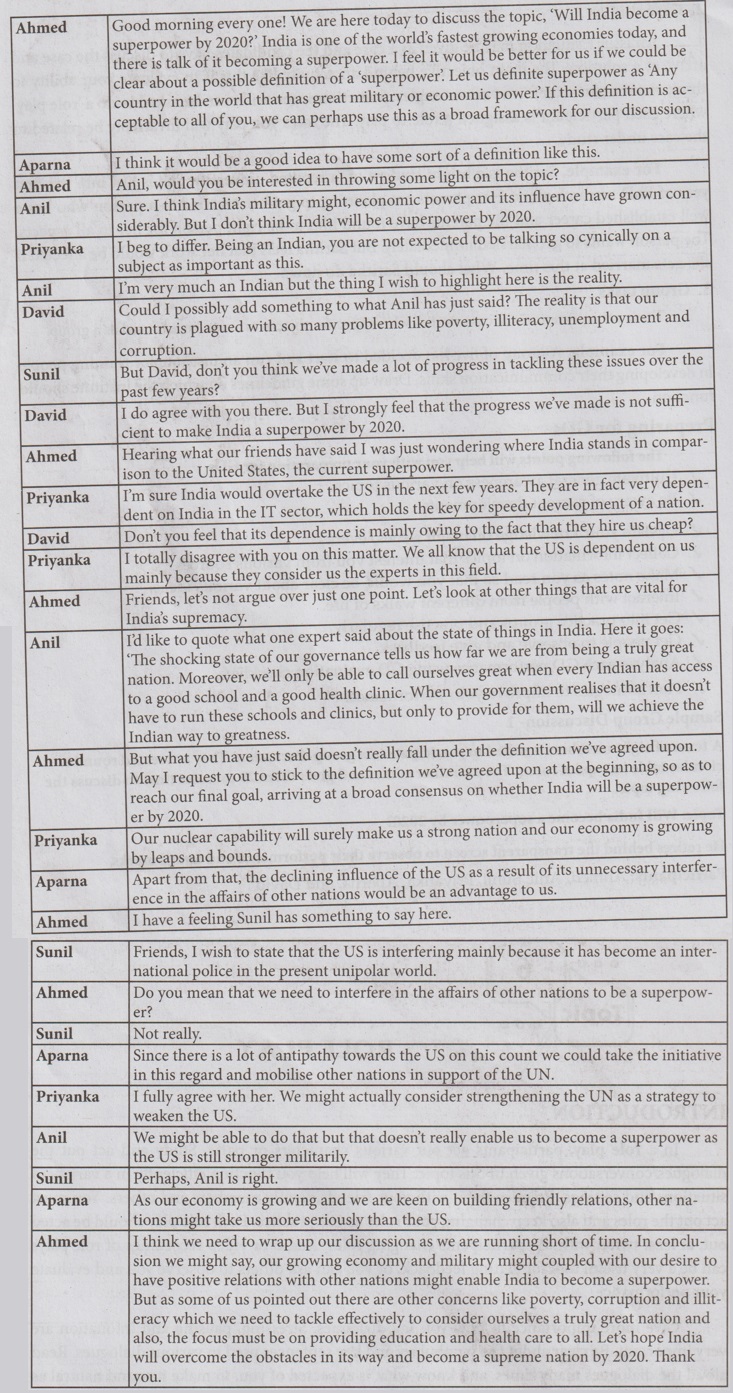Professional English I: Skill 6: Introduction to Effective Communication: Speaking
Group Discussions
Samples, Types, Topics | Speaking
A Group discussion (GD) is a type of interactive, oral communication which takes place when a group of people get together to discuss something.
Topic - 5 GROUP DISCUSSIONS A Group discussion (GD) is a type of interactive, oral communication which takes place when a group of people get together to discuss something. A group discussion can be informal or formal. An informal group discussion occurs when a group of friends talk about things in general at their college canteen, outside the classroom, at a bus stop or any other place; or when a family talks about various things, or when a group of people talk about various matters, such as sports, train travel, price rise, examinations, favourite film stars. In these informal discussions, each one freely expresses his views on the subject. In formal contexts, group discussions are increasingly used as a tool to identify candidates with the right abilities, either for employment for admission to various courses. Why are GDs Conducted? The work culture in most organisations has changed over the years. Employees are required to work together as a team. Team work calls for a variety of skills such as leadership, communication skills, conflict management and interpersonal skills. It is therefore important that everyone cultivates these skills and abilities, in order to be an effective team player at work. Employers need to determine if a candidate who has applied for a position has the skills and traits desirable for the job. So candidates are often asked to participate in a group discussion, mainly to determine his group-worthiness. Each candidate will be assessed on the following factors: The ability to fit into the group ✓ The ability to influence the group ✓ The ability to solve problems ✓ The ability to communicate effectively ✓ The ability to remain calm and composed in a stressful situation ✓ The ability to stay positive irrespective of his views being accepted or rejected. How are GDs Conducted? There is a great deal of variety in the methodology of conducting a group discussion. The following methodology is commonly used for various recruitments. In a GD, usually about ten candidates are made to sit in a circle/ semicircle or in a rectangular formation to discuss a topic given by the evaluator(s). The topic might or might not be announced before the discussion. ✓ As a rule, no one conducts the discussion. ✓ The candidates themselves have to organise it. ✓ The participants put their minds together and try to arrive at a consensus. ✓ The whole exercise may last for twenty minutes or more. ✓ The discussion may be stopped at the set time or even earlier. ✓ A conclusion or consensus may be asked for, though it usually does not occur. ✓ A written or oral summary might be asked for at the end from one of the candidates or each candidate. ✓ The candidates are observed and their performance is evaluated. ✓ The evaluation is done by experts who recommend the right candidate for the job, based on the skills the candidates display during the discussion. Types of GDs There are three types of GDs. They are 1. Topic -based GDs 2. Case studies 3. Group tasks 1. Topic-based GDs Topic based GDs can be classified into three, based on the kind of topic given. Factual Topics These are socio-economic topics. Here, sufficient background knowledge is required for effective participation. For example, “Environmental degradation”, “Traffic chaos”, “Yoga and Meditation” Controversial Topics These are argumentative in nature, and are meant to generate a lot of heat. The idea behind asking candidates to discuss a controversial topic is to see if they can display cool logic and equable temper and remain unruffled even when provoked. For example, 'Reservations must be banned Censorship must be abolished, 'Should brain drain be stopped? Abstract topics These are abstract concepts. They are given for discussions mainly to evaluate the candidates' creativity and imaginative faculty. For example, Money is sweeter than honey', 'Beauty lies in the eyes of the beholder’ 2. Case studies An issue / situation may be given as a case and the candidates have to discuss the case and arrive at a solution. The main objective behind an activity like this is to evaluate your ability to think about a situation form various angles. Sometimes, you will even be asked to do a role play where each participant is assigned a role to play. The roles you play will invariably be related to the case under study. For example, Saritha is a bright student of a reputed university. She is just into her first year of PhD research work. Her parents are planning to get her married to a person who has a well established career and the parents have found him to be right person for her in all aspects. The person wants to get married immediately. But Saritha feels that her work would be affected if she gets married at this time. What should Saritha do now? 3. Group tasks These are an extension of case studies where specific objectives are to be achieved as a group. For example, A group of five has decided to start and run an institute for training people in developing their communication skills. Draw up some guidelines on which the institute should function. Preparing for GDs The following points will help you with your preparation for GDs. ✓ Cultivate general awareness on various topics. ✓ Be aware of current developments ✓ Update your knowledge on major issues/events ✓ Collect information on topics that interest you from various sources. ✓ Make notes as you read so that you would be clear about various ideas. ✓ Interact with people from different walks of life. ✓ Get into practice groups and practise regularly. ✓ Get people to observe and give feedback. ✓ Analyse each GD performance using GD evaluation checklists. ✓ Plan strategies to improve your performance. Sample Group Discussion-1 A team of eight members is called to participate in a group discussion. They are seated round a circular table in a quiet room. The examiner comes and gives them 20 minutes time to discuss the following topic. Topic: Will India become a superpower by 2020? He retires behind the transparent screen to observe their performance and award marks. Participants: Ahmed, Anil, Sunil, Priyanka, Aparna, and David 1. Advantages of Co-education 2. How to deal with International terrorism? 3. Is globalization really necessary? 4. India needs a dictator. 5. Beauty contests degrade womanhood. 6. Value-based politics is the need of the hour. 7. Religion should not be mixed with politics. 8. Multinational corporations: Are they devils in disguise? 9. Does banning fashion shows and New Year parties save our culture?. 10. Are big dams necessary? 11. Marriage is a social trap. 12. What should India strive for Westernization or Modernization? 13. Reservations for women. 14. Advertising is a diplomatic way of telling a lie. 15. Joint family is a blessing in disguise. 16. Higher education should be made possible only for those who can pay for it. 17. Women cannot successfully combine both career and home. 18. Daughters are more caring than sons. 19. Developing countries should spend more on development than on defense. 20. Capital punishment should be abolished.INTRODUCTION

Topics for Group Discussions
Professional English I: Skill 6: Introduction to Effective Communication: Speaking : Tag: : Samples, Types, Topics | Speaking - Group Discussions
Related Topics
Related Subjects
Professional English I
HS3151 1st semester | 2021 Regulation | 1st Semester Common to all Dept 2021 Regulation
